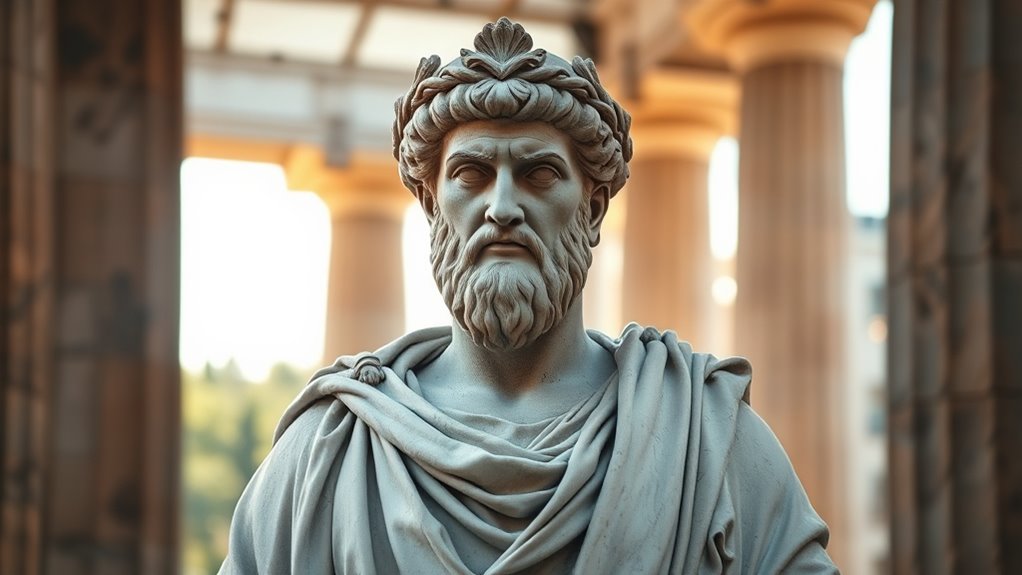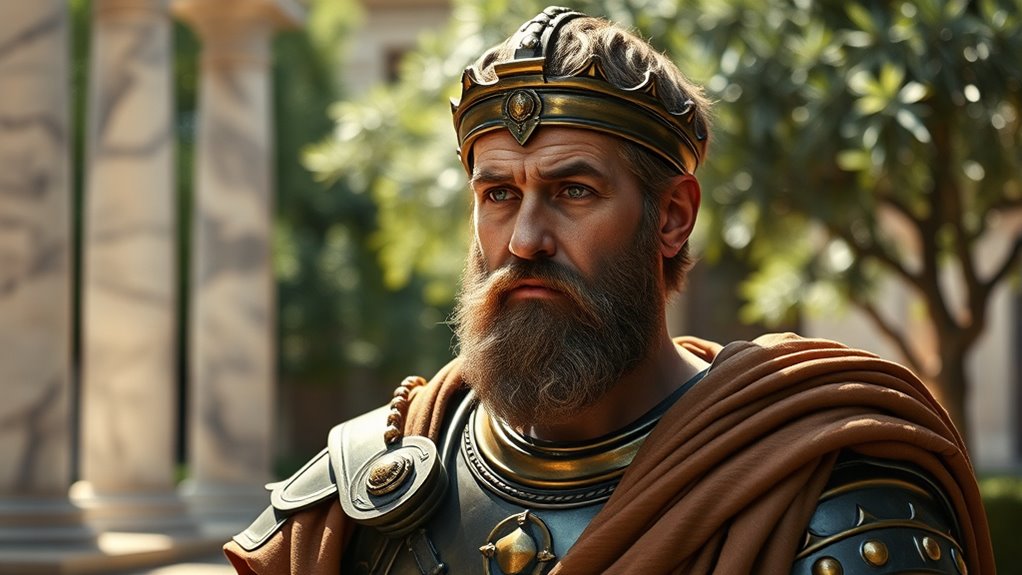By choosing forgiveness and maintaining your moral integrity, you demonstrate true strength, aligning with Marcus Aurelius’s insight that the best revenge is to be unlike your enemy. Instead of retaliating, you rise above petty conflicts by exercising patience and resilience. Your calm response shows you’re in control and unshaken by negativity. If you stay committed to virtue, you’ll find that living differently from your enemies not only frees you emotionally but also elevates your character—more than you might think.
Key Takeaways
- True strength lies in maintaining dignity and moral integrity, not in retaliating against enemies.
- Forgiveness demonstrates resilience and moral superiority, freeing oneself from bitterness and resentment.
- Responding with patience and understanding reflects Stoic virtues and inner resilience.
- Living differently from those who harm shows moral strength and inspires others.
- Inner peace and happiness depend on self-control and virtuous responses, not external circumstances.

Have you ever wondered how true strength lies in rising above your enemies? When faced with betrayal, insults, or unfair treatment, it’s tempting to retaliate or sink to their level. But real resilience and moral integrity come from choosing a different path—one that reflects inner strength rather than reactive anger. Marcus Aurelius understood this well. He believed that the best revenge isn’t about revenge at all; it’s about maintaining your dignity and staying true to your values, regardless of what others do. Forgiveness plays a vital role here. It doesn’t mean forgetting or excusing harmful actions, but rather releasing the destructive grip of resentment. When you forgive, you free yourself from the cycle of bitterness that keeps you tied to your enemies’ negativity. This act of forgiveness demonstrates resilience because it shows you can endure pain without letting it define you. It’s a way of asserting your moral integrity—staying true to your principles even when others abandon theirs.
By choosing forgiveness over revenge, you’re fundamentally saying that your moral compass guides your actions, not the provocations of others. You prove that you’re better than the petty conflicts and destructive impulses that often dominate human interactions. This doesn’t mean you become passive or weak; instead, it reflects a profound strength rooted in self-control and a clear sense of purpose. Marcus Aurelius’s Stoic philosophy emphasizes that your happiness and peace depend on how you respond, not on external circumstances. When you respond with patience and understanding, you demonstrate resilience—an ability to withstand adversity without breaking your moral code. This resilience allows you to confront enemies with calmness, knowing that your integrity remains intact no matter their actions. Additionally, choosing a path of virtue aligns with the importance of color accuracy in cultivating an authentic and morally upright character.
Choosing to be unlike your enemies doesn’t mean you ignore their wrongdoings. It means you refuse to mirror their negativity. You act with moral integrity by maintaining your values, even when others don’t. In doing so, you become a true reflection of strength—not the aggressive or vengeful, but the composed and principled. Marcus Aurelius’s teachings remind us that the highest form of revenge is to live a life that’s different from those who seek to harm us—one rooted in forgiveness, resilience, and unwavering moral integrity. When you embody these qualities, you not only elevate yourself above petty conflicts but also inspire others to do the same. That’s a power no enemy can overpower, because it’s rooted in your authentic, unshakeable character.
Frequently Asked Questions
How Did Marcus Aurelius’s Philosophy Influence His Rulership?
Your leadership was deeply shaped by Marcus Aurelius’s philosophy, emphasizing virtue cultivation and integrity. You see his example as a call to act with honesty, patience, and humility, even in challenging times. By embodying these values, you foster trust and respect among your followers. His emphasis on self-control and resilience encourages you to lead with moral strength, setting a powerful standard for governance rooted in virtue rather than revenge or anger.
What Specific Enemies Did Marcus Aurelius Refer To?
Like a ship steering treacherous waters, you see Marcus Aurelius’s enemies as personal vendettas and political rivals. He refers to those who oppose him, whether through betrayal or ambition, as enemies. Yet, he advises you to stand apart, not in hatred but in virtue, showing that true strength lies in being unlike them—resisting revenge and embodying wisdom and self-control, even when facing adversity and opposition.
Are There Modern Examples of This Revenge Philosophy?
You can see modern retaliation as choosing ethical forgiveness over revenge, embodying Marcus Aurelius’ philosophy. Instead of responding with hostility, you act with integrity, demonstrating strength by being unlike your enemies. For example, when someone wrongs you, you might forgive and move forward, showing resilience. This approach fosters personal growth and peace, proving that true revenge isn’t retaliation but maintaining your values and integrity despite provocation.
How Can This Principle Be Applied in Everyday Conflicts?
Picture yourself as a calm lake, untouched by storms. When conflicts arise, practice emotional control and choose kindness over revenge. Instead of fighting fire with fire, respond with patience and understanding. This approach transforms disputes into opportunities for conflict resolution, making you unlike your enemy. By maintaining composure and empathy, you set a powerful example, diffusing tension and fostering peace in everyday disagreements.
Did Marcus Aurelius Ever Struggle to Embody This Philosophy?
You might wonder if Marcus Aurelius ever struggled to embody this philosophy. It’s likely he faced moments of emotional turmoil that challenged his inner peace and emotional resilience. Like anyone, he probably encountered situations where maintaining stoic calm was difficult. Yet, his commitment to being unlike his enemies helped him preserve inner peace, showing that even great leaders grapple with these struggles, and perseverance in virtue is key to overcoming them.
Conclusion
Remember, when faced with your enemies, choose to shine like a lone star in a cloudy sky—steadfast and unyielding. Instead of mirroring their darkness, let your integrity be the lighthouse guiding others through the storm. By embodying virtue and refusing to stoop to their level, you carve a path of resilience and grace. Ultimately, your true strength lies in being a radiant contrast, proving that the coolest fire is one that burns without turning to ash.









